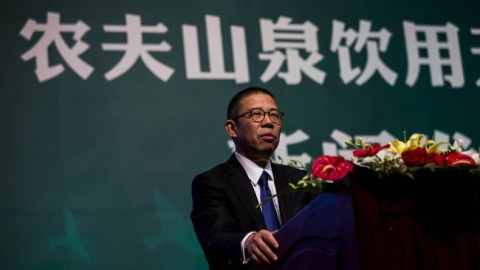Oct 27, 2021, 17:20

Bottled-water tycoon Zhong Shanshan has become China's wealthiest person, according to an annual ranking released Wednesday.
Zhong, in his late 60s, has seen his fortune swell following the stock listings last year of his Nongfu Spring mineral water and separate pharma company Wantai Biological Pharmacy Enterprise, which has tapped into massive demand for Covid-19 test kits.
He is worth $60.5 billion, according to the Hurun Rich List, up seven percent.
Zhong was ranked third last year.
Co-founder of Alibaba Jack Ma, last year's richest, dropped to fifth as his fortune shrank 36 percent to $39.6 billion.
Pony Ma, boss of gaming giant and WeChat owner Tencent, dropped two spots to fourth after his fortune shrank by 19 percent.
Second place was taken by TikTok founder Zhang Yiming.
The Hurun Research Institute, which compiles the list, said that for the first time the real estate sector had no names in the Top 10.
The overall number of individuals in China worth at least two billion yuan ($310 million) grew by 520 to a total of 2,918, Hurun said.
Growth in the electric vehicle market, in particular, fuelled the rising fortunes of several entrepreneurs, according to the list.
It's just a ranking based on market capitalization of his shares in an enterprise selling something that however everyone needs. Who would have thought one can be the richest in the land from selling bottled water? He is at the top today because others fell this year.
Admittedly, his company has tackled the challenge of how to deliver bottled water on time throughout the land despite competition from water filter suppliers and thus local water bottlers.
It's logistics and transportation inasmuch production, quality control and maintaining stock level that have been attained.
The margin will be trifling per bottle but when millions are sold a day under the same brand, it can add to a tidy sum that reports well in the next financial statement so that a healthy uptick in sales equates to brand fixture in the minds of millions and that leverages into share attractiveness, if anything because the demand is certain and growing, and the branding is stable enough as an investible in a market awash with cash chasing short-term investments.
It's all easy to see why. When a country starts new, just like a growing youngster, it will trace a S-shaped sigmoid curve of development.
There will initially be fast growth in basic things like housing, infrastructure, utilities and daily consummables.
Then, at the next stage, people will start looking for better replacement for consummables like cleaner water in easier packing because they start to travel more or work/live in more congested places.
Then the next stage of adding value to the basic activities before the curve reaches a plateau. E-commerce takes flight with marketing and trading getting into e-marketplaces, financing getting into e-finance, telecommunications getting into smart devices and applications, and smart healthcare gets onboard.
But once the plateau is reached after the middle age of both country and individual, what's to be the next stage becomes the paramount issue. That's why the refocus on fundamentals of research and innovation becomes crucial if one is not to atrophy at the plateau and go into decline. New ideas, discoveries and possibilities need to be found quickly to avert that decline.
Both country and individual need a new storyboard because there will be new generations coming into being as users and consumers whether locally or globally. Creating and meeting new demands are what will push the envelope of progress ahead.
The biggest challenge is to make a revolutionary shift from the old paradigm which had disintermediated basic bricks into bandwidth networks, thereby creating an information economy. In other words, what's next after the information economy that can create a thousand new industries?
As for individual wealth, the very rich won't be able to spend it all on themselves. If they keep growing their wealth for themselves, it is tantamount to hoarding something whose value is only derived from others more than from one's own foresight, initial sacrifice, hardwork, and the good luck of being able to do something successful at the right time and the right place.
If those who are not on the list can do more to give back to society from what less they have, what more should the super-rich.
After all, if they give all only to their next generations, they will be adding the same burden to them what they themselves are facing today. The burden of making a real difference with their fortune which only came about because society had recognized their worth as money makers.
Doing good back to society is palatable once one asks how much can a super-rich spend on oneself. The more one has, the less its essence will be experienced and valued. This is the fate of man. To execute the last disintermediation from obvious attachments and move into a seemingly unprovable sublimity.
ren
(webterren DOSed?)
Community login







Add a comment